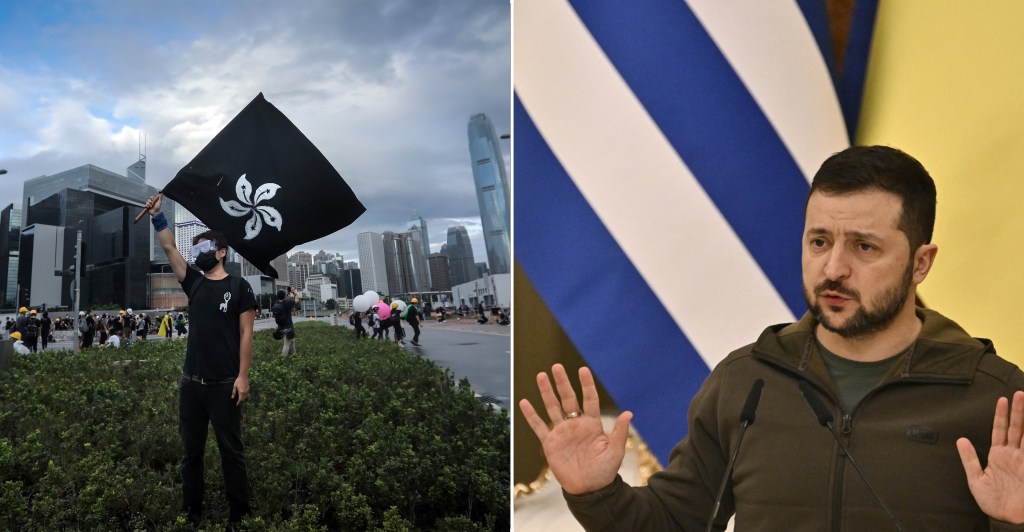Hong Kong lawmakers accused their own government of colluding with a violent mob of suspected pro-Beijing triads who brutally attacked peaceful protesters Sunday, in the most violent incident since protests began in the city seven weeks ago.
Video footage posted to social media captured the violent scenes as dozens of men dressed in white, most of them masked, set upon passengers in Yuen Long metro station Sunday night following a mass protest.
Videos by VICE
The footage shows the mob, widely suspected to be triad gang members, storming the station and rushing subway cars, using metal and wooden rods to thrash protesters who were travelling home from the demonstration.
Forty-five people were hospitalized, one in critical condition and five in serious condition. Among those hospitalized were journalist Gwyneth Ho, who was assaulted as she was livestreaming the attacks, and pro-democracy MP Lam Cheuk-ting, who suffered broken fingers, a gash near his mouth, and other injuries.
The shocking attacks in Yuen Long, close to a major crossing point between Hong Kong and mainland China, drew swift criticism of police from lawmakers and pro-democracy activists, who questioned why officers took so long to respond to the violence.
Police arrived at the station over an hour and a half after the first emergency calls and long after the marauding mob had dispersed. They made no arrests at the scene, claiming that they could not identify anyone carrying weapons, although four men were arrested on Monday on suspicion of involvement, Hong Kong public broadcaster RTHK reported.
On Sunday night, Junius Ho, a pro-Beijing lawmaker who lives in Yuen Long, was filmed shaking hands with men dressed in white and giving them the thumbs-up signal.
READ MORE: Pepper spray, batons and a half-bitten finger: Hong Kong’s weekend of protests
A statement released by 24 pro-democracy MPs Monday accused police of wilfully ignoring the violence in Yuen Long. “The police, who are like the servants of triads, have completely lost the public’s trust, forcing people to defend themselves,” read the statement. “The situation makes people wonder if [Chief Executive] Carrie Lam received instructions from the [Chinese Communist] party to cause divisions among the public.”
Lam Cheuk-ting, the lawmaker injured in the attack, asked reporters: “Is Hong Kong now allowing triads to do what they want, beating up people on the street with weapons?”
But in a press conference Monday, the embattled Carrie Lam appeared to blame both sides for the violence. “Violence will only breed more violence and at the end of the day the whole of Hong Kong and the people will suffer,” she said.
Standing beside her, Police Commissioner Stephen Lo denied accusations law enforcement officials had colluded with gangs hired to attack protesters.
“We will investigate whether we were inefficient but we are not related to triads,” he said, claiming his force had been tied up policing the mass demonstration on Hong Kong island, an hour away. “We and the triads are totally at opposite ends. People must not insult us by linking us with the attackers.”
Ho, the pro-Beijing lawmaker filmed shaking hands with the men in white, also said he had nothing to do with the attack.
Sunday’s unrest marked the most violent turn yet in Hong Kong’s turbulent summer of protest, which has seen mass demonstrations held on seven consecutive weekends. The demonstrations began with demands for the government to scrap a controversial bill — which the government suspended under pressure from protesters — allowing extraditions to the mainland. The protests have since grown into a broader movement calling for greater democratic protections and rejecting Beijing’s increasingly repressive grip on the city.
READ MORE: Hong Kong is braced for a brutal crackdown from Beijing
Under Beijing’s 1997 handover agreement with the UK, the former British colony was promised a high degree of autonomy and greater freedoms than citizens enjoy on the mainland. But concerns have grown in recent years that Beijing is ignoring the terms of the deal to clamp down on Hong Kong’s political and civil liberties.
Sunday’s violence at Yuen Long came shortly after the latest mass rally in central Hong Kong, in which thousands of demonstrators ignored the police-sanctioned route to march to the Beijing government’s representative office in the city. Protesters threw eggs at the emblem of the People’s Republic of China, and covered the building with graffiti, infuriating the Beijing government. Chinese state media thundered against the protesters Monday, labelling the vandalism a “blatant challenge to the central government.”
Cover: A broken umbrella flies by near riot police, during confrontation with protesters in Hong Kong Sunday, July 21, 2019. Hong Kong police launched tear gas at protesters Sunday after a massive pro-democracy march continued late into the evening. The action was the latest confrontation between police and demonstrators who have taken to the streets to protest an extradition bill and call for electoral reforms in the Chinese territory. (Andy Lo/HK01 via AP)




